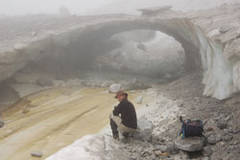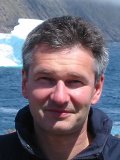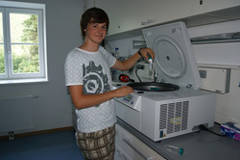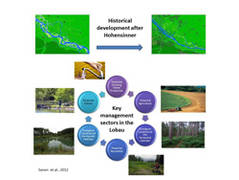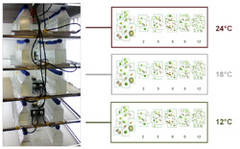Glaciers store organic matter, which is released to alpine streams by glacial melt. In the light of global warming and disappearing glaciers worldwide, a team of limnologists around Tom Battin set out to explore the organic matter from 30 glaciers distributed throughout the Austrian Alps. In Nature Geoscience, Gabriel Singer, Christina Fasching and colleagues report about the unexpectedly high molecular diversity of organic matter stored in European glaciers and the contribution of this highly bioavailable organic carbon pool to microbial metabolism in downstream lotic ecosystems.
The PhD thesis of Nina Welti was selected by the Austrian newspaper "Presse" as PhD thesis of the week. The title of her thesis is "Nitrogen cycling in restored and disturbed riverine floodplains". In her thesis Nina Welti demonstrated how floodplain restoration alters the nitrate removal pathways and ultimately N2O and N2 emission. The thesis is based on field work, experimental approaches and an integrated model showing hot spots of denitrification in floodplains. The results of her research are presented in 4 international scientific publications.
The annual expert meeting with the topic "Insects and Climate Change" of the Entomological Society of Austria will take place at WasserCluster Lunz on October 13th.
The Austrian Federal Ministry for Agriculture, Forestry, Environment and Water Management recently funded the research project "FISK". Scientists around the research group of Martin Kainz (LIPTOX) will investigate how lipids of Arctic charr are affected by alternative fish feeds.
Fabian Hruska (GRG 10, Vienna) has received the "Dr. Hans Riegel Award" for his scholarly paper (Fachbereichsarbeit) about "Methane production of floodplain sediments in the Lobau".
Fabian Hruska is a 13th grade student of the "Laaer Berg Gymnasium GRG 10". For his scholarly paper, he investigated the methane and carbon dioxide emissions of different floodplain sediments in the Lobau near Vienna. The study was conducted at the WasserCluster Lunz within the course of the Sparkling Science project WESPe (financed by the Ministry of Environment). His supervisor at school was Mag.a Veronika Walenta-Draxler.
The ceremony takes splace at the University of Vienna on 21th September 2012.
We congratulate.
In the frame of the EU FP7 project WETWIN and based on the results of the BMwf ProVision project Optima Lobau experts from IHE Delft and WasserCluster Lunz published a paper on ecosystem tradeoffs in the urban floodplain Lobau
http://www.sciencedirect.com/science/article/pii/S0301479712003118
New article published in Oecologia about temperature and species richness effects in phytoplankton communities:
In this study, we investigated the combined effects of temperature and diversity on phytoplankton growth. In a controlled laboratory experiment, monocultures of different freshwater phytoplankton taxa (green algae, cyanobacteria, and diatoms) as well as mixed communities of different species richness (2–12 species) and taxa composition were exposed to different temperatures (12, 18, and 24 °C).
http://www.springerlink.com/content/3757253667657m87/?MUD=MP




